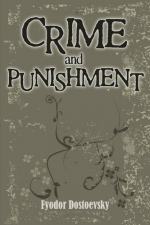|
|
Crime and Punishment Epilogue
Raskolnikov endures his trial, never trying to defend himself. However, evidence of Raskolnikov's past generosity, such as helping a fellow student and his father, rescuing two children from a fire, as well as other testimonies put him in a favorable light. He receives a reduced sentence of eight years of penal servitude in Siberia.
During the trial, Raskolnikov's mother becomes ill. Dounia tells her that Raskolnikov has gone off to a distant part of Russia on a business commission. The mother never asks about it, but always holds on to her belief that Raskolnikov will make a name for himself.
As Raskolnikov prepares to leave for Siberia, he is most concerned about his mother. With Sonia, he seems to harbor contempt, even though she is going with him. Two months after his departure, Dounia and Razumihin get married. The mother continues to live in a state of delirium and anxiety. Several months after Raskolnikov's departure, his mother dies. The things she says in delirium before her death reveal that she had known far more about Raskolnikov's situation than anyone had supposed.
Raskolnikov does not immediately hear about his mother's death, although Sonia keeps a regular correspondence with Dounia and Razumihin. From her letters, they can sense Raskolnikov's unhappiness. Sonia writes that her prison visits are met with indifference. She does not write much about herself except that she is doing some work as a seamstress.
Later on, they get word that Raskolnikov is ill. Raskolnikov falls ill not from the hardships of prison life but from his wounded pride. For him, existence is not enough; he lives for an idea, some truth. In prison, he wonders why he did not take his life at the Neva. Perhaps, he was aware of the dim light of hope within him. Raskolnikov is perplexed by the other prisoners who seem to cherish life in prison more than when in society. Why? he asks. All the prisoners despise him because he is different from them. They even attack him for being an infidel, an unbeliever. Yet, Raskolnikov is curious as to why they are all so fond of Sonia. She is known and beloved by everyone. "Little mother," the criminals call her.
In the hospital (during the period of Lent and Easter), Raskolnikov has a recurring dream. It is of a plague that overwhelms mankind. Those who are affected believe that they possess the truth. They begin to kill one another. Armies march against armies, and even destroy themselves. All barriers are broken and everything is transgressed. Only a few chosen ones are chosen to be saved, to start a new, pure race, but no one sees or hears them.
Topic Tracking: Sin/Transgression 9
A week after Easter, Raskolnikov finds out that Sonia is ill and will not visit for a few days. One morning, as Raskolnikov is standing at a bank of a river, Sonia quietly sits beside him. Something within him is stirred; he falls at Sonia's feet. Though frightened, Sonia realizes that he loves her.
"They wanted to speak, but could not; tears stood in their eyes. They were both pale and thin; but those sick pale faces were bright with the dawn of a new future, of a full resurrection into a new life. They were renewed by love; the heart of each held infinite sources of life for the heart of the other." Epilogue, pg. 471
That evening, Raskolnikov thinks of ways he can repay all of Sonia's past sufferings with his love. Even the other prisoners see him in a different light. Raskolnikov stops analyzing and starts feeling. "Life had stepped into the place of theory" (p. 471). Under his pillow lay the copy of the New Testament from which Sonia read the story of Lazarus. He had asked for it shortly before his illness. He prays whether her convictions can be his as well.
Topic Tracking: Redemption/Resurrection 9
That same night, Sonia is feeling ill, but happy. Only seven years; it shall be like seven days. But a new life would not be given easily; it would come with great suffering. However, that is another story-a story of a man born into a new life.



